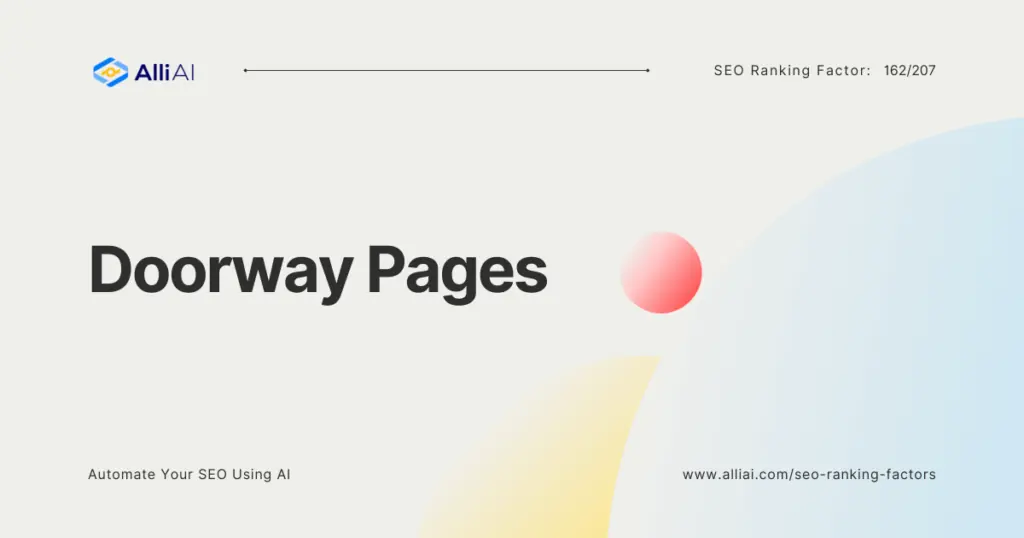What is a Doorway Page?
A doorway page is a web page created with the primary goal of ranking high in search engine results for specific phrases and directing visitors to a different page. These pages are often low-quality and lack substantial content, serving merely as a bridge to the actual content page. They’re typically optimized for a handful of keywords and are designed to manipulate search engine algorithms to gain unfair visibility.
Imagine you’re trying to find a new coffee shop in town. You see a sign pointing towards an alley promising an “Exclusive Coffee Experience” ahead. You follow it, expecting to find a cozy café at the end. Instead, the alley leads you to a different street, where the actual coffee shop is located. This redirection, which served no purpose other than to take you to the real destination via a specific route, is akin to a doorway page in the digital SEO landscape.
Why is a Doorway Page Important in SEO?
Doorway pages, also known as gateway pages, bridge pages, or jump pages, are essentially thin, content-poor pages created with the sole purpose of capturing traffic from specific search queries. They often lack unique or valuable information and are optimized for a handful of keywords to trick search engine algorithms into ranking them higher. Once a user lands on a doorway page, they are quickly redirected to the actual destination page, often through inconspicuous methods like meta refreshes or JavaScript redirects.
These pages come in various forms, each with its own deceptive tactics:
- Cloaked Doorways: These pages display different content to search engines than to human users, a tactic known as cloaking. Search engines might see keyword-rich content, while users are redirected to a less relevant page.
- Keyword-Stuffed Doorways: These pages are crammed with targeted keywords, often in an unnatural and spammy manner, in an attempt to manipulate search rankings.
- Doorway Domains: These are entire websites created solely for the purpose of funneling traffic to another main website.
Regardless of their specific form, doorway pages share a common goal: to exploit search engine algorithms and gain an unfair advantage in rankings. However, this manipulative practice has drawn the ire of search engines, who have become increasingly sophisticated at detecting and penalizing such tactics.
How Doorway Pages Affect SEO?
Google, the dominant player in the search engine realm, has taken a strong stance against doorway pages. Their Webmaster Guidelines explicitly state that doorway pages are considered deceptive and harmful to the user experience. They offer clear examples of what constitutes a doorway page, including pages that are:
- Created for specific search queries and lead users to intermediate pages that are less useful than the final destination.
- Generated to funnel visitors into the actual usable or relevant portion of a site.
- Made solely for drawing affiliate traffic without providing unique value.
Websites caught using doorway pages can face severe penalties, ranging from demoted rankings to complete removal from Google’s index. The infamous Google Panda algorithm update, launched in 2011, specifically targeted low-quality content and doorway pages, causing significant drops in traffic for many websites that had relied on these tactics.
Moreover, Google has continued to refine its algorithms to better detect and devalue doorway pages. This means that even if you manage to avoid immediate penalties, the long-term viability of doorway pages as an SEO strategy is extremely doubtful.
Legitimate Alternatives: Building a Sustainable SEO Strategy
While the allure of quick rankings might be tempting, the risks associated with doorway pages far outweigh any potential short-term gains. Instead, focus on building a sustainable SEO strategy that emphasizes:
- High-Quality Content: Create informative, engaging, and relevant content that genuinely addresses the needs and interests of your target audience.
- Technical SEO: Ensure your website is technically sound, with fast loading times, mobile-friendliness, and proper indexing.
- Relevant Backlinks: Earn backlinks from reputable websites in your industry or niche.
- User Experience (UX): Optimize your website for a positive user experience, with intuitive navigation, clear calls to action, and a visually appealing design.
By prioritizing these white-hat SEO practices, you can build a strong foundation for long-term success in search engine rankings, without resorting to deceptive tactics that could ultimately harm your website’s reputation and visibility.
FAQ
What distinguishes a doorway page from a landing page?
A landing page is designed to provide value directly related to the visitor’s intent and usually has a specific call-to-action (CTA), such as a subscription form or purchase option. In contrast, a doorway page lacks substantial content and serves mainly to redirect users to the actual content page, often through manipulative SEO tactics.
Are doorway pages ever acceptable in SEO practices?
Historically, doorway pages were used to try to improve SEO rankings. However, as search engines have evolved to prioritize user experience and content quality, the use of doorway pages is now strongly discouraged and can result in penalties.
How can I identify doorway pages on my website?
Doorway pages often have little to no unique content, are heavily optimized for specific keywords, and serve primarily to redirect users to another destination. Tools like Google Analytics can help identify sudden drops in traffic to specific pages, which may be penalized doorway pages. Additionally, a thorough website audit can reveal pages that serve no purpose or value to the user, potentially identifying them as doorway pages.
Conclusion
In conclusion, while doorway pages once played a role in SEO strategies, their relevance and effectiveness have drastically diminished. Today, they pose a significant risk to a website’s SEO and overall online reputation. To succeed in the current search landscape, emphasizing high-quality, valuable content that genuinely serves the user’s intent is crucial. By moving away from manipulative tactics like doorway pages, websites can build more sustainable and rewarding SEO strategies that stand the test of time and algorithm updates.






